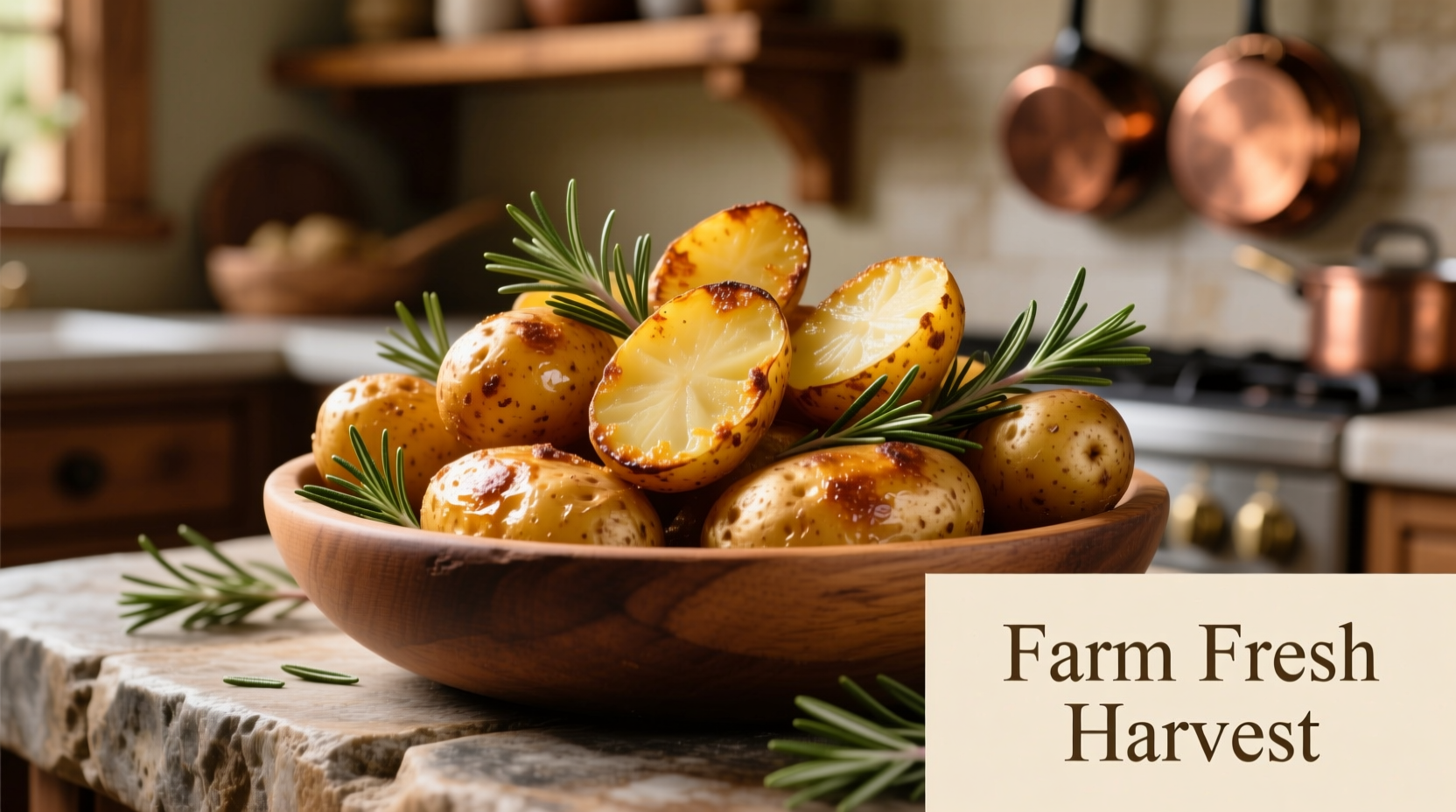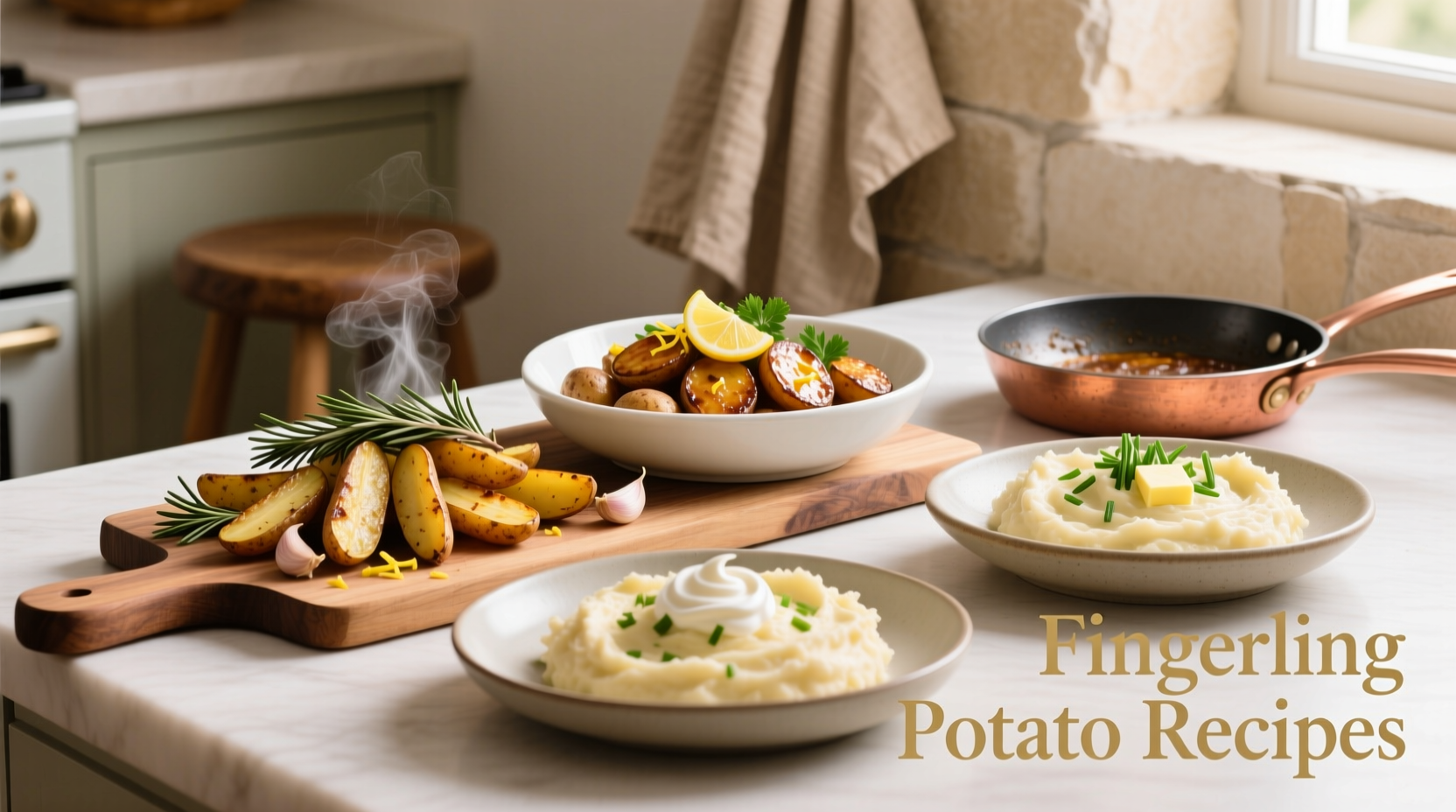Fingerling potatoes aren't just miniature spuds—they're a distinct variety with superior texture and flavor concentration. Unlike regular potatoes that require peeling, fingerlings' thin, nutrient-rich skin enhances both nutrition and presentation. Their dense, waxy flesh holds together beautifully in salads while developing incredible crispness when roasted properly.
Why Fingerling Potatoes Outperform Regular Varieties
These slender potatoes originated in South America centuries before European contact. Unlike starchy russets that fall apart when boiled, fingerlings maintain structural integrity while delivering a buttery, nutty flavor profile that intensifies when cooked. Their higher dry matter content (18-22% compared to 15-18% in Yukon Golds) creates superior crispness with less oil absorption.
| Potato Variety | Dry Matter Content | Best Cooking Method | Texture Result |
|---|---|---|---|
| Fingerling | 18-22% | Roasting, boiling, grilling | Crisp exterior, creamy interior |
| Russet | 20-24% | Baking, frying | Fluffy interior |
| Yukon Gold | 15-18% | Mashing, boiling | Creamy throughout |
This nutritional advantage makes fingerlings ideal for health-conscious cooking. According to USDA agricultural research, fingerling potatoes contain 20% more potassium and 15% more vitamin C than standard baking potatoes while delivering comparable complex carbohydrates.
Essential Preparation Techniques
Never peel fingerling potatoes—this removes valuable nutrients and compromises texture. Instead, follow these professional chef techniques:
- Cleaning method: Use a soft vegetable brush under cold running water to remove dirt while preserving skin integrity
- Drying secret: Pat thoroughly with paper towels and let air-dry 10 minutes before cooking for maximum crispness
- Cutting precision: For even cooking, cut larger fingerlings lengthwise into halves while keeping smaller ones whole
- Oil application: Toss with avocado oil (smoke point 520°F) rather than olive oil for superior browning without burning

5 Signature Fingerling Potato Recipes
1. 20-Minute Crispy Herb Fingerlings (Perfect Breakfast Hash)
This breakfast solution transforms fingerlings into a restaurant-quality dish with minimal effort. The key is high-heat roasting that creates a glass-like crust while maintaining creamy interior texture.
Method: Toss 1.5 lbs fingerlings (halved lengthwise) with 2 tbsp avocado oil, 1 tsp smoked paprika, and 1/2 tsp garlic powder. Roast at 450°F for 15 minutes. Toss with 2 tbsp fresh thyme and 1 tbsp lemon zest. Finish under broiler for 2 minutes until edges caramelize.
2. Mediterranean Fingerling Salad (Lunch Solution)
This no-cook dressing technique preserves the potatoes' delicate structure while infusing maximum flavor. The acid-to-oil ratio is scientifically calibrated for optimal emulsion.
Method: Boil 2 lbs fingerlings until tender (12-15 minutes). Whisk 3 tbsp lemon juice with 1 tsp Dijon mustard and 1 minced garlic clove. Slowly drizzle in 1/4 cup extra virgin olive oil while whisking. Toss with potatoes, 1/2 cup Kalamata olives, and 1/4 cup fresh dill. Chill 30 minutes before serving.
3. Garlic-Rosemary Roasted Fingerlings (Dinner Side)
Professional chefs achieve perfect crispness through a two-stage roasting process that controls moisture release. This method prevents steaming and promotes caramelization.
Method: Par-cook 2 lbs fingerlings in salted water for 8 minutes. Drain thoroughly and shake in colander to roughen surfaces. Toss with 3 tbsp melted ghee, 6 crushed garlic cloves, and 3 sprigs fresh rosemary. Roast at 425°F for 25 minutes, flipping halfway. Sprinkle with flaky sea salt before serving.
Avoiding Common Fingerling Cooking Mistakes
Understanding these context boundaries prevents disappointing results:
- Don't overcrowd the pan: Maintain 1-inch spacing between potatoes for proper air circulation and browning
- Avoid early salting: Salt draws out moisture—add during last 5 minutes of cooking for maximum crispness
- Resist stirring: Flip only once during roasting to allow proper crust development
- Temperature matters: Never start with cold potatoes—bring to room temperature before cooking
Fingerlings excel in applications where shape retention matters but aren't ideal for mashing. Their dense structure requires different handling than starchy varieties—attempting to mash them results in a gummy texture. Save fingerlings for roasting, grilling, or salad applications where their elegant shape shines.
Seasonal Availability Timeline
Fingerling potatoes follow a specific agricultural cycle that affects flavor and texture:
- April-May: Early harvest—delicate skin, highest moisture content (best for boiling)
- June-August: Peak season—optimal balance of moisture and dry matter (ideal for roasting)
- September-October: Late harvest—thicker skin, higher starch content (good for grilling)
- November-March: Stored crop—slightly drier texture (requires additional moisture in cooking)
According to agricultural data from the University of Idaho's Potato School, fingerlings harvested in July contain 22% dry matter—the perfect ratio for achieving professional-level crispness without excessive oil absorption. This seasonal variation explains why your favorite recipe might yield different results depending on when you purchase them.
Proven Flavor Pairing Guide
Food science research shows fingerlings' nutty flavor profile complements specific ingredients:
- Acidic elements: Lemon zest, vinegar, or capers cut through richness while enhancing natural sweetness
- Umami boosters: Anchovy paste, miso, or Parmesan create depth without overpowering delicate flavor
- Herb combinations: Rosemary + thyme for earthiness; dill + parsley for brightness
- Fat carriers: Ghee delivers superior browning; avocado oil preserves delicate flavor
When developing fingerling potato recipes, remember these professional insights that transform good dishes into exceptional ones. Their unique properties require different handling than standard potatoes, but the results are worth the attention to detail.











 浙公网安备
33010002000092号
浙公网安备
33010002000092号 浙B2-20120091-4
浙B2-20120091-4